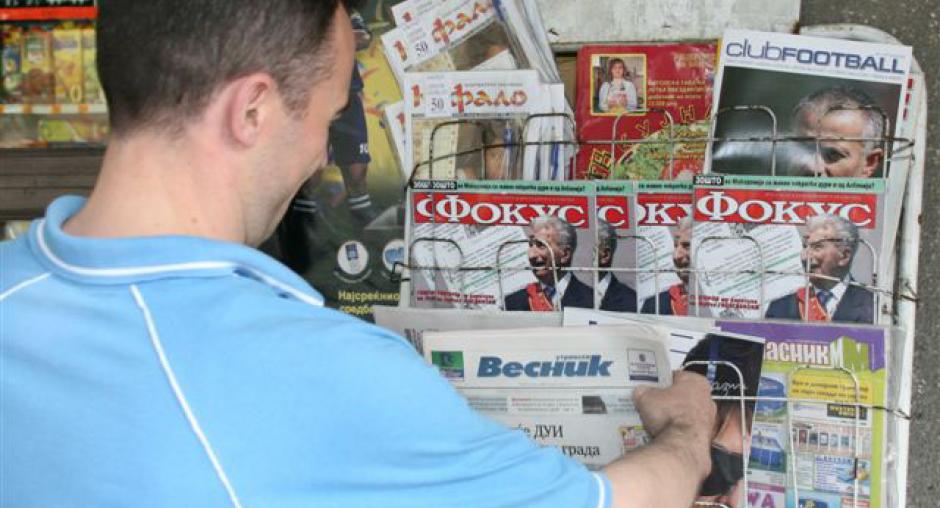OSCE Mission to Skopje supports continuing efforts to liberalize media landscape

The amendments to the Criminal Code, which replaced imprisonment with a system of fines, were warmly welcomed by the media in Skopje. The OSCE Representative on Freedom of the Media (RFOM), Miklos Haraszti, noted that the changes would have "a liberating effect" on journalists.
"When they are not under threat of being imprisoned for practicing their profession, editors, reporters and commentators can better perform their duty by informing citizens, and contribute to greater transparency in public life," commented Haraszti.
The success in passing the amendments was the result of long-term co-operation between the country's authorities and various organizations active in supporting media freedom, including the OSCE Spillover Monitor Mission to Skopje.
Sharing best practices
A key stage in the process was an international conference on best practices in decriminalizing defamation held in Skopje on 9-10 February this year, organized by the local Association of Journalists (AJM) and the Macedonian Institute for Media (MIM), and supported by the OSCE Mission and the RFOM.
Participants from Albania, Austria, Bulgaria, Croatia, France, Georgia, Serbia and Montenegro, the United Kingdom and Ukraine, as well as experts from the Council of Europe, Article 19, the International Federation of Journalists and the UK Press Complaints Commission shared their expertise with their colleagues from Skopje.
Subjects covered included the legal aspects of decriminalizing defamation; the role of civil society in the promotion of reforms; the justifications and limitations of Civil Code penalties; achieving a balance between freedom of expression and protecting reputations; self-regulatory mechanisms and journalistic ethics.
Minister of Justice Meri Mladenovska, who opened the conference, was instrumental in drafting the changes to the Criminal Code and arguing for the need to adopt more progressive laws. She also said that the Government would "accept the challenge to begin a discussion on full decriminalization as part of a broader process."
Further support for liberalization
But the success in getting the defamation law changed does not mean the end of the Skopje Mission's support for the authorities' efforts to liberalize the media environment. The Mission is continuing to fund the NGO Coalition "All for Fair Trials", which monitors how the judiciary handles defamation cases.
"The liberalization of legislation is a good first step, but the true test is in implementation of the laws in the courtrooms around the country. This is not a choice between respecting laws on one side and allowing freedom of expression on the other, it is a matter of implementing a key democratic principle: that a free media implies the absence of coercion - or even the threat of coercion - from state bodies," says Victor Ullom, Head of the Mission to Skopje's Rule of Law Unit.
"We look forward to the reports from our implementing partner organization who will be observing how the judiciary deals with defamation cases under the new legal framework."
Monitoring court cases
In the period January-June 2006, "All for Fair Trials" identified and monitored 26 criminal cases launched against journalists for defamation and libel, a total of 58 trial hearings in front of three main courts.
The Coalition, which recommends further moves towards full decriminalization of the defamation laws and the transfer of cases in this category to the civil arena, is continuing to monitor the cases and its final report will be presented to the public in December this year.
"We are facing a situation where fines are often unjustifiably high, jeopardizing the financial position and even the existence of certain media," says Marijana Netkovska, Project Co-ordinator with the Coalition. "The Criminal Code needs to clearly set the legal limitations of the penalties that can be applied in these cases.
"What also concerns us is that in 90 per cent of monitored cases, the criminal proceedings are initiated by public officials. This leads us to the conclusion that state figures and holders of public functions still cannot accept being the subject of criticism by the media, which is an essential tool for the development of a public oversight mechanism as a democratic process in the country," she adds.
Self-regulation by the media
But as Biljana Petkovska of the MIM points out, guaranteeing media freedom and professionalism is not only a matter of law. Journalists themselves must ensure a responsible approach to freedom of expression by adopting high ethical and professional standards, playing the role of watchdog not only for society as a whole, but also among themselves.
"The Government has done its job and now we as journalists should do our part. It is time to work on the development of independent media self-regulatory bodies to help ensure journalists do their work in a professional and ethical manner," says Petkovska.

